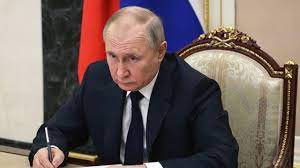26th June 2023

It was a weekend of turmoil that sent shockwaves throughout Russia, as a development unfolded, plunging the nation into a colossal domestic crisis. The chief of Russia’s notorious private militia, the Wagner Group, known for its involvement in the Ukrainian conflict alongside the Russian armed forces, appeared to have gone rogue. In a shocking act of rebellion against the Russian army, he led his men on a march towards Moscow, seizing control of Russia’s military headquarters in Rostov. This unprecedented turn of events sent waves of uncertainty across the country.
Warlord Yevgeny Prigozhin, the enigmatic figure behind the Wagner Group, took to Telegram to disseminate a series of messages and videos alleging, without any substantiated evidence, that the military had mercilessly killed numerous Wagner fighters in an airstrike. President Vladimir Putin swiftly condemned the revolt as an act of “treason” and vowed to punish those who joined Prigozhin in his “criminal” insurrection. In a bizarre twist, Belarusian leader Alexander Lukashenko managed to broker a truce on Saturday, temporarily diffusing the tension.
The timing of the Wagner Group’s revolt and its public criticism of the Kremlin could not have been more critical. As Russia continued its invasion of Ukraine, the internal dynamics of this mercenary group remained shrouded in mystery. However, it is widely believed that many of the estimated 50,000 fighters, predominantly former convicts, have actively participated in the war against Ukraine. The public fallout between the Wagner Group and the military establishment painted a picture of a divided Russia, offering a glimmer of hope for Ukrainian forces seeking to assert themselves in the face of Russian vulnerability.

For President Putin, who has been striving to demonstrate his unwavering authority and keep the military engaged in this protracted and costly war, the revelations brought forth by the Wagner boss posed a significant challenge. In a surprising turn, Mr. Prigozhin called off the march, and the Kremlin reversed its decision to prosecute those involved in the insurrection. However, it is undeniable that this entire episode left President Putin looking vulnerable and exposed. It provided the world with a glimpse of anarchy within Russia, which is far from a reassuring sign for a leader who had to rely on his Belarusian counterpart to salvage the situation.
The events of this weekend have undoubtedly highlighted deep-rooted fissures within the Russian power structure. The Wagner Group’s rebellion showcased a level of disloyalty and discontent that cannot be easily ignored. The fact that it occurred amidst a critical phase of the invasion in Ukraine only magnifies its significance. As international observers closely monitor Russia’s actions, the world is witnessing a weakened Putin, grappling to maintain control over his country’s military and contain the fallout from a renegade militia.
The repercussions of this crisis are far-reaching. The implications extend beyond Russia’s borders, as neighboring countries keenly observe the internal fractures that have been exposed. The Kremlin’s ability to project strength and unity has been undermined, leaving room for strategic maneuvering by other nations seeking to capitalize on Russia’s perceived vulnerability.
As Russia navigates this precarious situation, the question remains: Can President Putin restore order and reassert his authority, or will this weekend uprising mark the beginning of a new era of uncertainty? The world watches with bated breath, waiting to see how the leader of the Russian Federation will address this unprecedented challenge to his rule.

